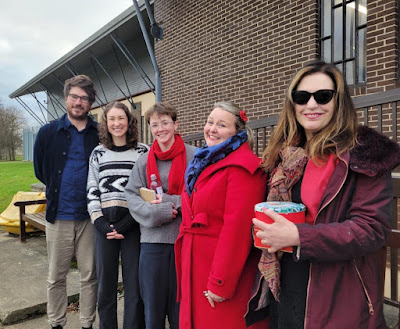What a week that was. Forgetting that my surgeon told me last year I had to slow down, on Tuesday we wound up our pilot course, attached to both the Durham-based campaign Advocating Classics Education and the Durham Leverhulme-funded research project Aristotle beyond the Academy, bringing ancient civilizations and especially ethics to students in prisons. It has been an extraordinarily fulfilling activity for me and we hope to expand it nationally.
The men’s favourite sessions were all
related to Aristotle: they lapped up Arlene Holmes-Henderson’s advice on
effective communication via his Rhetoric, and with George Gazis’ help debated
Neoptolemus’ decision to change his mind and help the suffering Philoctetes in Sophocles’
tragedy—a mind-change of which Aristotle approves—after performing the play with
enormous verve. Philoctetes’ vocalisations were thrilling and we gave him the
Best Actor trophy.
But the favourite session was Professor Phil Horky on the
Nicomachean Ethics. What is happiness and will you be happier if you try to be
the best version of your moral self? Questions for the ages. There will be a
podcast on this whole course soon, with the students themselves talking, made by
our wonderful colleagues at Against the Lore. Everyone enjoyed my home-made
vanilla and chocolate chip cookies (contained in festive tin, below), I’m pleased to report.
Wednesday saw three
back-to-back events in Durham: first up, Alessandro Vatri’s excellent
paper on Margaret Doody’s Aristotle Detective novels; Arlene Homes-Henderson
then launched her essential new Centre for Classics Education Research and Engagements (CERES), which will transform how we understand the history and practice of
classical-subject pedagogy. I had made a cake for her, which wasn’t as good as
the cookies but served its purpose. Last up was Nebojša Todorović’s superb
Durham Prize in Classical Reception lecture on Greek literature and its
performance reception in relation to the Balkan War of the 1990s.
Thursday was
much sadder, as we held a valedictory retrospective event for our department’s beloved
emeritus professor Christopher Rowe, who is mortally ill. He spoke with such
mirth and sometimes trenchant barbs about his life in philosophy that my tears, at least, turned from those of
grief to near-convulsive laughter. He has changed Platonic and Aristotelian
Studies, but he also transformed the Department when I was first there in the
early 2000s. More on this titan of virtue and friendship anon. People were
relieved that I had done no baking and had offered shop-bought mince pies instead.




